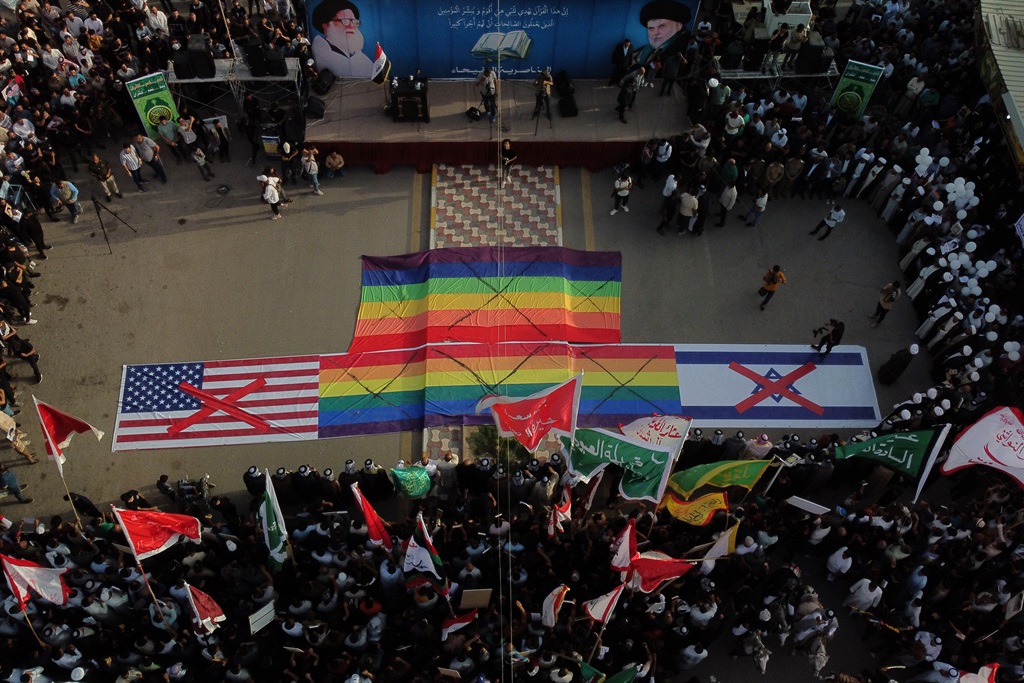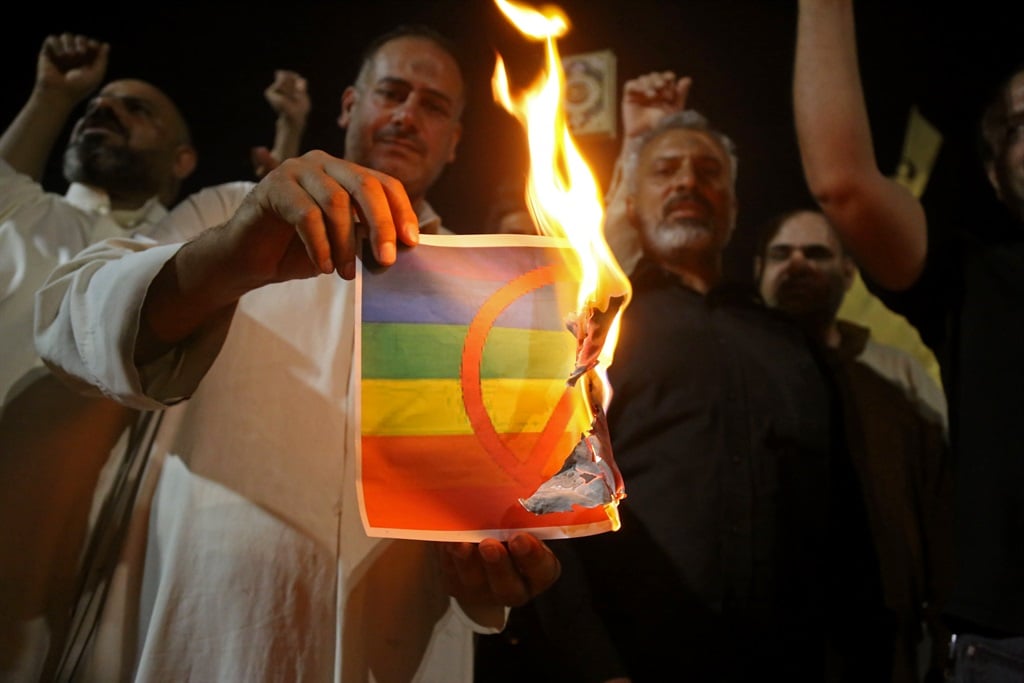
Iraqi Shiite Muslims prepare to set ablaze signs representing the flags of the US, the LGBTQ+ community and Israel, during a protest in Nasiriyah on 4 July 2023 against a Koran burning outside a Stockholm mosque that outraged Muslims around the world.
- An amendment
to an anti-prostitution law in Iraq could lead to the death penalty for “homosexual
relations”. - Although
there are no laws punishing homosexual relations in Iraq, LGBTQ individuals have
already been targeted and prosecuted. - The proposed
law change has support in the predominantly Islamist parliament.
A law
amendment in Iraq proposes capital punishment for homosexual relations, in what
campaigners call a “dangerous” escalation in the country where LGBTQ
people already face frequent attacks and discrimination.
The
amendment to a 1988 anti-prostitution law, which passed a first reading in
parliament last week, would enable courts to issue “the death penalty or
life imprisonment” sentences for “homosexual relations”,
according to a document seen by AFP.
Homosexuality,
much like other gender issues, remains taboo in Iraq’s conservative society,
though no existing laws explicitly punish homosexual relations.
But members
of the LGBTQ community have been prosecuted for sodomy or under vague morality
and anti-prostitution clauses in Iraq’s penal code.
LGBTQ
Iraqis have been forced into the shadows, often targeted with
“kidnappings, rapes, torture and murders” that go unpunished,
according to a 2022 report by Human Rights Watch and the IraQueer
non-governmental organisation.
Rasha Younes,
LGBTQ rights researcher at HRW, described the proposed legislation as a
“dangerous step”.
“That
means that Iraqi individuals’ life and constant fear of being hunted down and
killed by armed groups with impunity is now going to translate into the law itself,”
she said.
“The
Iraqi government (is) using the rights of LGBT people to distract the public
from its lack of delivery.”
The law
change appears to have broad support in the Islamist-majority assembly.
The
amendment was “still under discussion and subject to exchanges of
viewpoints”, said Saud al-Saadi, member of Shiite Muslim party Huquq, the
political wing of the powerful Iran-aligned Hezbollah Brigades and part of the
ruling coalition.
READ | Four arrested in Uganda over ‘acts of homosexuality’
Saadi said
a second reading had yet to be scheduled, and argued parliament aims to
“fill a legal vacuum”.
Lawmaker
Sharif Suleiman of the Kurdistan Democratic Party said the proposed legislation
reflects “our moral and human values and our fights against abnormal
social phenomena”.
“We
need deterrent laws,” he told government newspaper Al-Sabah.
‘My life will
end’
The
amendment would also set a minimum seven-year prison term for “promoting
homosexuality”, according to the text seen by AFP.
Other
measures seek to restrict open discussion of gender issues, as Iraqi politicians
and social media users have increasingly resorted to anti-LGBTQ rhetoric in the
past few months.
The
national media and communications commission is considering banning Iraq-based
publications from using the term “homosexuality”, a source at the body
said.
Instead,
media outlets would be advised to use the derogatory term “sexual
deviance”, according to the source, and the term “gender” would
also be banned if the measure is adopted.
READ | Ethiopia’s capital Addis Ababa launches crackdown on ‘homosexual acts’ in hotels and bars
Shiite
cleric Moqtada al-Sadr, who wields great political influence but is not part of
the government, called in a social media post late last year on “all
believers” to “oppose homosexual society, not through violence… but
through education and awareness”.
Sadr’s
supporters have burned rainbow flags in their demonstrations this summer
protesting Koran burning in Sweden after he said this was “the best way to
provoke” those who support or defend such actions.
The surge
in anti-LGBTQ sentiment has stoked further fear among members of the community.
“The
situation has become too complicated because we are not protected by the
authorities,” said Iraqi gay man Abdallah, requesting to be identified by
first name only.
The
33-year-old left Baghdad for Turkey at the height of the recent protests near
the Swedish embassy in the Iraqi capital.
“If
someone finds out that I’m gay and has a problem with me, they can send my name
or photo to armed groups,” he told AFP.
“My life
will end.”


